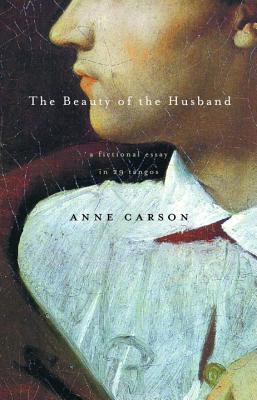The Beauty of the Husband: A Fictional Essay in 29 Tangos (Vintage Contemporaries) (Paperback)

Staff Reviews
Yes, there is a titular beautiful husband, a wife, and mistresses, but no simple math primer of quotidian pains and accrued betrayals. Read and reread this book for passages such as, "Philosophers say man forms himself in dialogue" and, "I overlooked one thing./ That the beautiful when I encountered it would turn out to be prior -- inside my own heart, already eaten." Sleep with this book because Carson resurrects the flawed avatar of John Keats in twenty-nine epigrams. For passage/poem/tango V, she chooses "one of the most mysterious of semi-speculations is, one would suppose, that of one's Mind's imagining into another." Yes.
— Yvonne
An essay-in-poetry concerning Keats' dictum that beauty is truth, as explored through a relationship as it breaks apart over time. Because God knows, there is nothing nearly as beautiful as somebody who is just about to break your heart.
— MadeleineDescription
The Beauty Of The Husband is an essay on Keats’s idea that beauty is truth, and is also the story of a marriage. It is told in 29 tangos. A tango (like a marriage) is something you have to dance to the end.
This clear-eyed, brutal, moving, darkly funny book tells a single story in an immediate, accessible voice–29 “tangos” of narrative verse that take us vividly through erotic, painful, and heartbreaking scenes from a long-time marriage that falls apart. Only award-winning poet Anne Carson could create a work that takes on the oldest of lyrical subjects–love–and make it this powerful, this fresh, this devastating.
About the Author
ANNE CARSON was born in Canada and has been a professor of Classics for over thirty years. Her awards and honors include the Lannan Award, the Pushcart Prize, the Griffin Trust Award for Excellence in Poetry, and fellowships from the Guggenheim and MacArthur Foundations.
Praise For…
“An exquisite meditation on love and loss that reads with the emotional depth–and with the ongoing resonance–of a great novel.”–Elle
“[An] eerie, elliptical, very beautiful elegy for a failed marriage.... Her verse pierces the mind with a laserlike light.”–The New York Times
“Her best book.... Her poetry’s form and sensibility are quite unlike anything else.”–The Globe & Mail (Toronto)

